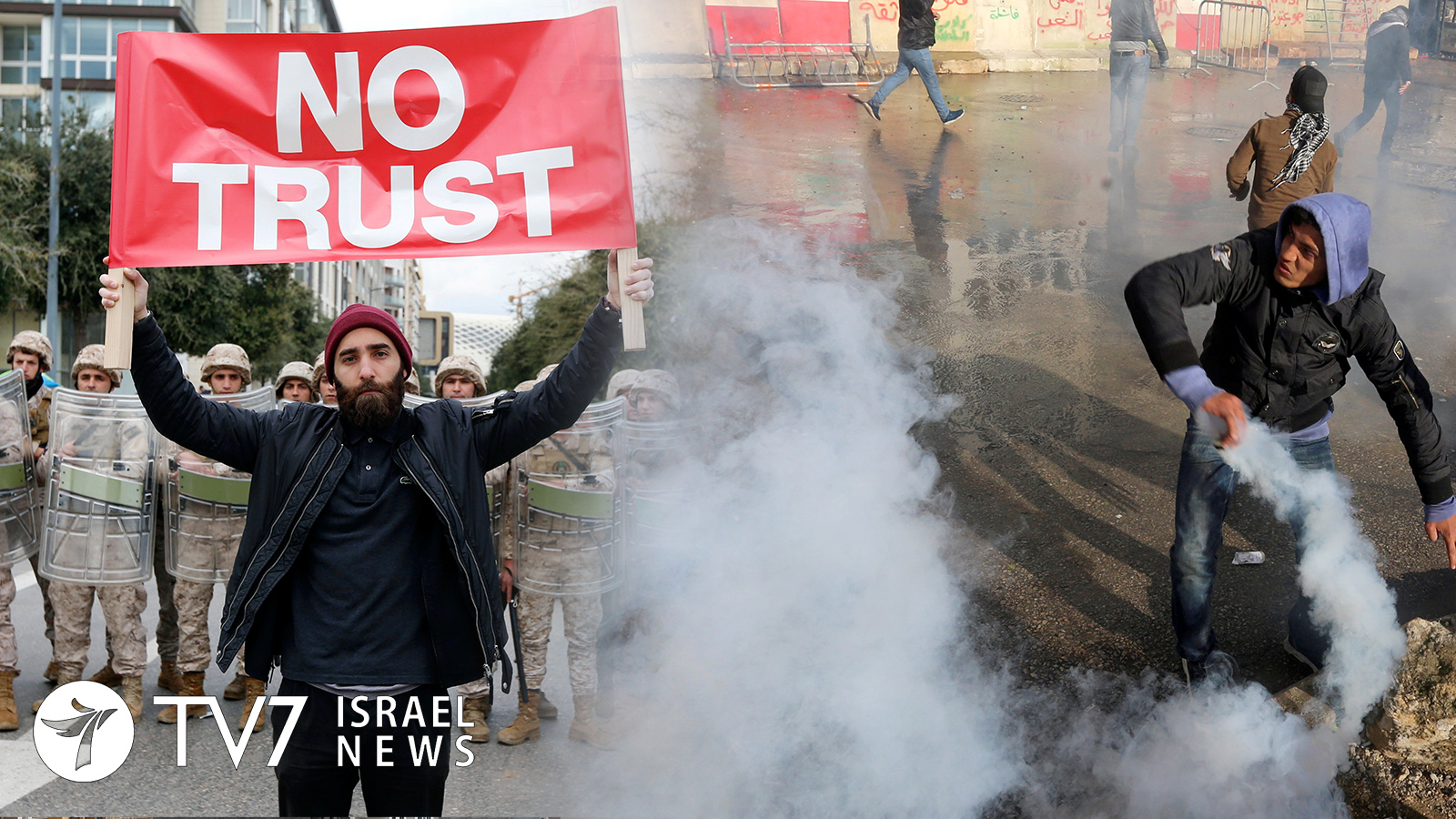Hundreds of Lebanese citizens were injured outside the parliament building in Beirut, as members of the new government were inside awarding as the new cabinet selected by Prime Minister Hassan Diab a vote of confidence.
Clashes with security forces reached fever pitch in Beirut after protesters began to amass early in the morning on Tuesday (February 11) at central areas of the capital, intent on preventing Cabinet ministers and legislators from reaching the heavily-barricaded parliament. Many chanted “No confidence!” as they attempted to close roads to obstruct passage. The car of Labor Minister Demianos Katta was pelted with eggs after being surrounded and pounded by the protesters’ fists until they were dispersed by security forces. Others lobbed rocks, shot fireworks and hurled garbage containers at special forces and riot police, who responded with the firing of tear gas and water cannon.
Abdel Rahman Zakaria, a protester from Akkar in north Lebanon, was cited by Reuters as questioning riot police, “Who are you protecting? The corrupt state that stole from us? It’s a shame.”
The Lebanese Red Cross said 373 people were treated for injuries, with 45 taken to hospital.
The country has been gripped by anti-government protests since October in demand of sweeping reforms and an end to the ruling, political class viewed as corrupt and incompetent. The Republic is enduring the worst financial crisis since its 1990s civil war, marked by high unemployment and an estimated loss of more than 200,000 jobs since the crisis erupted.
The United Nations Special Coordinator for Lebanon warned that a potential new migrant crisis unfolding into Europe is looming – similar to the refugee flight from Lebanon’s neighbor, Syria – if immediate action is taken by Beirut politicians. Ján Kubiš told Sky News that Lebanon is facing “a new level of social unrest and chaos without the implementation of reforms to address a deepening economic crisis.”
Diab’s cabinet was formed in January by Hezbollah and its political allies. The Iran-backed organization, which has been designated internationally as a terror group, holds majority power in Lebanon’s parliament. The new government took office nearly three months after former-Premier Saad al-Hariri’s government resigned under pressure from nationwide mass protests in streets.
The government faces a liquidity crunch, shattered confidence in banks which have imposed informal controls, as well as a deteriorating Lebanese pound and soaring inflation. According to a policy statement issued by the new government, “painful steps” will be implemented to overcome the financial crisis which has led the currency to lose a third of its value and banks to severely curb access to deposits. A copy published by local media detailed an “emergency rescue plan,” as well as reforms of the judicial, financial and administrative sectors aimed at minimizing corruption and repairing the failing economy. One of the most immediate issues is how the heavily indebted state will deal with maturities including a $1.2 billion Eurobond due in March, which is only one part of $2.5 billion owed this year. The newly sworn in cabinet is hoping a financial rescue plan that formed the basis of its confidence vote in parliament can help pull the country from a deep financial crisis.
Speaking just before the vote, Prime Minister Hassan Diab described his government’s task as a “suicide mission” that involves trying to put out a quickly approaching “fire ball.” As Parliamentary Speaker Nabih Berri and other MP’s looked on, Diab said “we must be honest and acknowledge that the risk of collapsing is unfortunately not imaginary. We want to save the country, but we cannot complete this suicide mission, if the ones standing behind us are waiting for the moment to push us over the edge without a salvage rope.”
Lebanese MP Alain Aoun said, ”We urgently need a government with a financial plan that enables us to face the prospect of the maturing Eurobond in March, that’s part of it. We can’t just say whether we will pay the maturing debt or not out of our heads, we need today a plan and for this plan to be credible and receive trust externally and internally. We need an international financial institution like the IMF (International Monetary Fund) to give it the credibility it needs, and that will open the door for us if we want to consider debt restructuring and negotiating with creditors.”
After the vote, MO Simon Abi Ramya described Lebanon as a moving vehicle that “has been driving towards the edge of the cliff.” He said “now there is someone at the driver’s seat,” adding that “if this person is smart and wise and responsible then he will lead us to safety and if not, then we will be going down. We have given him the chance to succeed.”
The new cabinet is comprised of 18 ministers rather than the previous 24. They were appointed by Diab from a list proposed by political parties participating in the government. The country is parliamentary democracy based on confessionalism, designed to prevent sectarian conflict through a balanced representation of the 18 recognized religious groups in government. The system mandates the assignation of those holding higher office according to pre-set religious groups. Only Maronite Christians can serve as President, Sunni Muslims as Prime Minister, Shi’ite Muslims as Parliamentary Speaker, while Eastern Orthodox Christian are designated as Deputy Premiers and Deputy Parliamentary Speakers.
Outside parliament, the protests raged on. Demonstrators in the nearby Martyr’s Square in central Beirut chanted: ”Thief, thief, Nabih Berri is a thief.” A crane removed concrete blocks that had secured the road to the legislature, one of which was defaced with graffiti reading “No Trust” in English and “Give people back their money” in Arabic. One protester identified as Fadi Hamdan reacted to the government’s vote of confidence by saying “Our job is to stay on the streets, as a pressure card” to force the new government to resolve the political and economic crisis.
